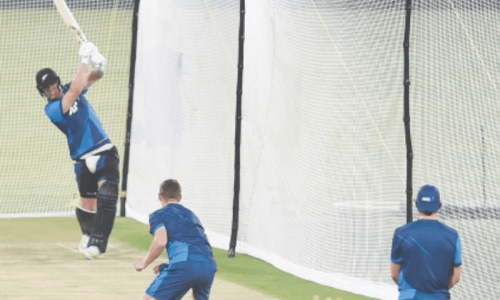
All of a sudden, things are looking extremely favourable for Pakistan cricket. There are some key reasons behind this, both direct and indirect, but the most important factor is effective leadership.
Through a combination of accident and default, there is a mature and capable captain at the helm, and he is working wonders in combination with the coach, who is providing a calm and composed elder-brother influence. Natural talent has never been an issue with Pakistan. Now that they are being nurtured under the shade of the Misbah-Mohsin partnership, the boys are flourishing.
Questions have been asked of Misbah’s mindset and tactical approach, but you can’t argue with the results he has produced. He now has eight Test wins and only one defeat. Prior to the start of the series with England, his winning record was undermined by not having faced elite opposition. True, he had won the series against Sri Lanka, which is a major international team, but he hadn’t beaten one of the Big Four—Australia, South Africa, England or India.
To be sure, Misbah did captain Pakistan against South Africa—his first series as captain, which was played in the UAE in late 2010—but he came away with a 0-0 draw. Now he has conquered England, which is a bigger fish, indeed the biggest fish of all, as judged by the ICC’s robust rankings system. On top of that, his own batting form has been tremendous, with an average of 70.81 in 14 Tests as captain, compared with 33.60 in his 19 other Tests. He is leading from the front and inspiring the team to not merely play to their potential, but to exceed it. Even his limited overs captaincy record has been outstanding, winning 13 ODIs out of 14, and all five out of five T20 internationals.
The fact is that Misbah’s critics have nowhere left to hide. Only five of his compatriots have more Test wins than Misbah’s eight, and they are all hallowed names—Waqar Younis (10), Inzamamul Haq (11), Wasim Akram (12), and Miandad and Imran (14 each). Misbah could well be headed for the top of this list. Most impressive is his lack of defeats, which places Misbah’s win-loss ratio of 8.00 head and shoulders above everybody else’s.
One of the standard strategic lessons taught in any business school is that great success can come from converting a crisis into an opportunity. Misbah, an educated man with an MBA, appears to have absorbed this lesson well. When he took over the Test captaincy, in November 2010, Pakistan was reeling from a nightmarish run of scandals and mishaps that had gone on for too long. Morale was shattered, and the team’s performance had reached rock bottom. If all this wasn’t bad enough, there was a petty and incompetent PCB chairman in office, who was handling cricket affairs like a bull in a china shop.
Slowly and thoughtfully, Misbah guided Pakistan out of this morass. His style was sedate but judicious, cautious yet competitive. He used the adversity surrounding the team to create a bonding force that knit the boys together. In May 2011, he was forced to assume the limited-overs captaincy as well, after Shahid Afridi fell out with then PCB chairman Ijaz Butt. Misbah responded to this hiccup with deftness and maturity.
Pakistan is never an easy team to captain, not the least because there are often one or more ex-captains in the side. Inevitably, such a set-up becomes fertile ground for intrigue and dissent. Yet Misbah tackled this scenario well. His interactions with Afridi and Younis Khan, the two ex-captains who are regular selections, conveyed an easy chemistry and mutual respect. Misbah provided them with the space and status they deserve, and they responded with diligence and effort. This is a telling measure of Misbah’s management ability and depth.
Undoubtedly, a key part of Misbah’s success is the quietly steadfast support he has received from coach Mohsin Khan. The criticism against Mohsin has been that he is not an activist or interventionist, but such criticism fails to understand that activism or interventionism is not the need of the moment. When things are clicking and the desired results are coming through, needless tinkering and fiddling can be poison. Mohsin is providing exactly the kind of presence that Pakistan cricket needs right now—watchful, wise, and vigilant, and a buffer between the captain and the administrative infrastructure.
For a while now, the PCB has been hell-bent on replacing Mohsin with Australian Dave Whatmore. But now that Mohsin has supervised a series win against the world’s top-ranked team, circumstances have outrun the stale thinking of our cricket bosses. Hopefully, they will realise their folly before it is too late.













































